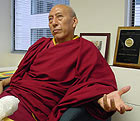
Samdhong Rinpoche gives an interview in Washington, DC.
On Wednesday morning Samdhong Rinpoche met with Bob Reilly, the director of Voice of America (VOA), and was interviewed by VOA Tibetan, Chinese and English language services.
Later in the day, he visited Capitol Hill, meeting with Congressman Frank Wolf and other congressional staff, and Senator Dianne Feinstein hosted a lunch meeting for him at the Members’ dining room in the Capitol.
On July 9, after a briefing on the International Campaign for Tibet’s work, Samdhong Rinpoche attended a reception hosted by the National Endowment for Democracy (NED) where he met U.S. First lady Laura Bush, several Members of Congress and the President of the European Parliament, Pat Cox, who is on an official visit in the United States.
Samdhong Rinpoche was accompanied by Lodi Gyari, Special Envoy of H.H. the Dalai Lama, and Representative Nawang Rabgyal of the Office of Tibet.
The first lady was the keynote speaker at NED’s Annual Democracy Award to four outstanding women activists from the Muslim World. The Kalon Tripa was invited as a special guest.
At the ceremony NED Chairman Vin Weber recognized Kalon Tripa in his remarks, saying that the Tibetan struggle was something that NED felt deeply about and referred to the Kalon Tripa as the head of the Tibetan Government-in-Exile, who is the first democratically elected leader of the Tibetan diaspora.
Under Secretary of State for Global Affairs Paula Dobriansky, who is the U.S. Tibet coordinator, introduced First Lady Bush and referred to the Tibetan issue in her remarks.
The award ceremony was attended by Senators, Congressmen, members of the diplomatic corp as well as democracy and human rights leaders.
The Kalon Tripa is scheduled to meet U.S. Tibet Coordinator Paula Dobriansky on July 11.
Samdhong Rinpoche fled from Tibet to India in 1959. He has taught Buddhist philosophy and has headed the Central Institute of Higher Tibetan Studies (CIHTS, Varanasi), the premier institute for Buddhist philosophy studies today.
In 1990, he was a member of the Drafting Committee Constitution of the Future Polity of Tibet and Charter for the exiled Tibetans. From 1991 to 1995 His Holiness the Dalai Lama nominated him as a member of the Assembly of Tibetan People’s Deputies, and he served as its chairman for two terms.
He became the first directly elected Chairman of the Cabinet of the Tibetan Government-in-Exile in September 2001.
He is an internationally renowned scholar and philosopher. He has also initiated projects to retranslate several Buddhist scriptures, from Tibetan into Sanskrit, which were lost in their original language.
He is a proponent of the nonviolent tradition and has followed the Gandhian approach in his life and work. He has organized the translation into Tibetan of several of Gandhi’s work, particularly relating to nonviolence.

